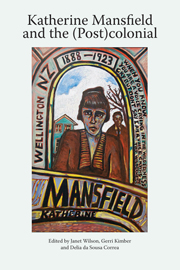Introduction
Published online by Cambridge University Press: 05 March 2014
Summary
The articles in this volume of Katherine Mansfield Studies explore Mansfield's identity as a (post)colonial writer in relation to her foremost reputation as a European modernist. In seeking new possibilities for alignments with, and resolutions to, the contradictory agendas implied by these terms, they address the clashing perspectives between her life in Europe, where her troubled self-designation as the ‘little colonial’ became a fertile source of her distinctive brand of literary modernism, and her ongoing, complex relationship with her New Zealand homeland. As Elleke Boehmer notes, Mansfield's dualistic personae ‘of modernist artist as outsider and of colonial outsider as modernist’ mean that, like other modernist writers such as Jean Rhys, C. L. R. James, and Mulk Raj Anand, she can be positioned in ways that challenge and re-centre commonplace hierarchies: of the metropolitan centre over the underdeveloped periphery, of male modernists like Joyce, Eliot, and Yeats, over women writers, of modernist genres of novel and poetry over that of the short story. Yet this special volume goes beyond generic boundaries and historical periodisation implied by terms like ‘modernist’ and ‘colonial’. Collectively the essays here explore Mansield as a (post)colonial modernist writer whose anticipatory discourse demonstrates a consciousness about resistance that precedes the founding of the postcolonial state; that is, an already known postcolonial vision. Katherine Mansfield and the (Post)colonial, marks the emergence of a current of Mansield criticism that has previously lain dormant under the pressure of other theories and approaches: feminist, generic, biographical and social or historical.
- Type
- Chapter
- Information
- Katherine Mansfield and the (Post)colonial , pp. 1 - 12Publisher: Edinburgh University PressPrint publication year: 2013



